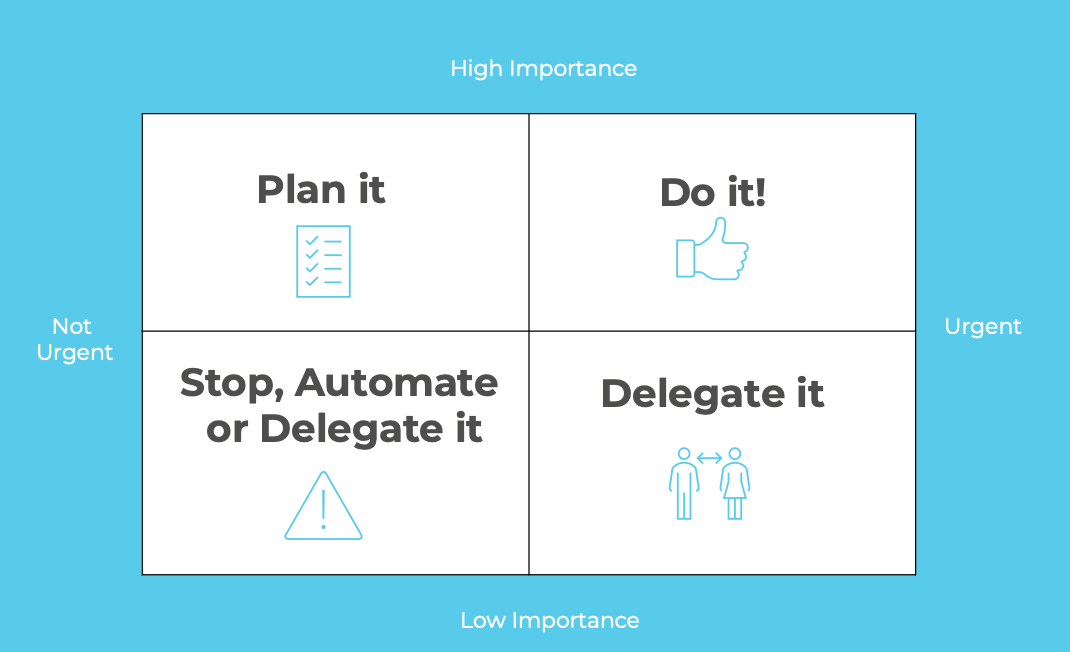
Helen Bryant
How to delegate in hybrid
Delegating can be tricky, especially in the hybrid world in which we work now, where we don't see each other as often.
Have you ever delegated a piece of work and then when you got it back, it wasn't at all what you had in mind? Or, if you delegated work and then been wondering and worrying about where it's up to? Or, have you just given up and decided it's just quicker and easier to do it yourself, even though it'll take you more time. And even though, you know, you haven't got that much time.
Have you ever delegated a piece of work and then when you got it back, it wasn't at all what you had in mind? Or, if you delegated work and then been wondering and worrying about where it's up to? Or, have you just given up and decided it's just quicker and easier to do it yourself, even though it'll take you more time. And even though, you know, you haven't got that much time.
Well, if you answered yes to any of those questions, I've made this video, especially for you.
By the end, you will be able to delegate with confidence, clearly explain to a team member, what it is that you would like to have done and leave them empowered and able to get on with that work. I'm going to share with you five steps, simple, actionable advice that if you follow will help you delegate brilliantly and free up that valuable time that we all need.
Write your awesome label here.
Read the transcript here
Why is delegating in hybrid so tricky?
Well, the truth is we don't see each other so often and there's friction in how we collaborate and communicate as a result of that. So if we think about it quite often, when we are co-located, we often rely on ad hoc ways of communicating and also as a manager you can just look across the floor and see what's going on. So you can swoop in if needed. Now, if people are working remotely from you, you have to be much more intentional when you delegate so that there is a clear understanding of what the task is at hand and what your expectations are behind it.
And often it gets lost in translation. And as much as we think we've been clear, we haven't.
Another problem people encounter is knowing the boundary between the work that you've given to someone else to do and your involvement in it. And particularly if there is a low level of trust, or you're not confident that the person knows exactly what it is to do or how to do it, there's a tendency to swoop back in and take back control from the person. At its absolute worst that can turn into micromanagement, which no team member wants.
Another problem people encounter is knowing the boundary between the work that you've given to someone else to do and your involvement in it. And particularly if there is a low level of trust, or you're not confident that the person knows exactly what it is to do or how to do it, there's a tendency to swoop back in and take back control from the person. At its absolute worst that can turn into micromanagement, which no team member wants.
There are big opportunities in getting delegation right
However, that is such a big opportunity and getting it right. First and most importantly, it's going to free up time to work on the important and high-value activities that you need to do.
Secondly, delegating is a brilliant opportunity to build the skills of your team around you. So building the capability of your team and in this day and age, when the great resignation is rife, people are really looking for job roles that challenge them, help them learn new skills and have new experiences. So the more you can deliver that for people the better.
Secondly, delegating is a brilliant opportunity to build the skills of your team around you. So building the capability of your team and in this day and age, when the great resignation is rife, people are really looking for job roles that challenge them, help them learn new skills and have new experiences. So the more you can deliver that for people the better.
5 steps to better delegation
Step #1 Work out what to delegate
The first step is working out what you need to delegate. And the important thing here to remember is prioritisation, grouping up similar tasks and knowing who does what on them. I think using this four-box matrix, which looks at urgency and importance is one of the easiest ways of doing that.

It's divided by high importance to low importance, top to bottom and urgent to non-urgent right to left. The first box that we're interested in is high importance and urgent, this is your domain. You do this. This is work that will be adding value, but it is obviously important to the organisation in which you work, and as a consequence needs your personal touch.
The second box is of high importance, but not as urgent. The thing you have on your side here is time, time to plan. Now it may well be when you've planned the workout that you can involve your team and delegate some or all of that work. But because of its importance, you need to think about how that work will be organized and done.
In the third box we're now we're looking at the work that's less important, but still urgent. Now, this is the delegation zone and this is where you need to be calling on your team to get work done and get it off your to-do list.
The bottom left-hand box is not important and not urgent. This can be habitual work that you're just doing and not really thinking about, but if you stop and take control of this box, it can release a lot of time, both for you and your team.
The second box is of high importance, but not as urgent. The thing you have on your side here is time, time to plan. Now it may well be when you've planned the workout that you can involve your team and delegate some or all of that work. But because of its importance, you need to think about how that work will be organized and done.
In the third box we're now we're looking at the work that's less important, but still urgent. Now, this is the delegation zone and this is where you need to be calling on your team to get work done and get it off your to-do list.
The bottom left-hand box is not important and not urgent. This can be habitual work that you're just doing and not really thinking about, but if you stop and take control of this box, it can release a lot of time, both for you and your team.
You want to think here, can it be just stopped completely? We don't need to do this. Secondly, you might want to automate it. So looking into software solutions, simple software solutions, where you can automate it and get it off your to-do list.
Or finally, you might want to delegate it, but definitely, this is not where you want to be spending your time.
This matrix helps you plan out what the work is and it's level of importance, and as a consequence, who will be doing it. So you've got things that you need delegating.
This matrix helps you plan out what the work is and it's level of importance, and as a consequence, who will be doing it. So you've got things that you need delegating.
Step #2 Think about who will be doing this work
The next thing to do in step two is to think about who you are delegating it to before you go and have this conversation. The key thing to think about here is what is the level of experience of the person you're intending to delegate this to? Because this will help you in the planning of your brief because if somebody has less experience, you're probably going to be a bit more prescriptive.
You're going to need more time to train them up, to do this task, but if you train them up and you will free up the time.
Or somebody may have loads of experience, completely know how to do this. And it really is about the briefing and let them crack on with the job. This helps you tailor your message, but also remember people are looking for development opportunities so the more you can think about this as you're planning out who would be the right person to do this job the better.
Or somebody may have loads of experience, completely know how to do this. And it really is about the briefing and let them crack on with the job. This helps you tailor your message, but also remember people are looking for development opportunities so the more you can think about this as you're planning out who would be the right person to do this job the better.

Step #3 Brief the task
Now step three is the bit that most people associate with delegating and it's briefing the individual. And the most important thing to remember here is you need to describe the outcome. What you're really doing is describing what is "done".
Actually, people often describe how they want something done without ever really describing what's the end game. What would a good job look like? You can help yourself here by using phrases like "my expectations are..", or "for me, a good job on this would be..", and then bringing it to life by describing what it would look like. You're not telling them how to do it. You're describing what you want to be done.
Another important point to share with the person is the context. This is valuable in telling people why they're doing this piece of work, perhaps how it connects to other pieces of work, who the audience is, who the customers are, and how it gets used, any context like this can really help people focus on the most important parts within this task that you're doing.
Another thing to be really clear on, and do not miss out on are the specifics around timings, including milestones if it's a bigger project, when do you want this work done?
In hybrid, it's really important to share who are the stakeholders. Because people are not working near each other, often they don't know each other as well. So the more in this environment, you can be specific about who the stakeholders are on this piece of work. Who are you expecting people to engage with if they are working with someone else or need to get somebody else's view the better, because this really helps people connect with the right people, as opposed to just people they know.
Another important point to share with the person is the context. This is valuable in telling people why they're doing this piece of work, perhaps how it connects to other pieces of work, who the audience is, who the customers are, and how it gets used, any context like this can really help people focus on the most important parts within this task that you're doing.
Another thing to be really clear on, and do not miss out on are the specifics around timings, including milestones if it's a bigger project, when do you want this work done?
In hybrid, it's really important to share who are the stakeholders. Because people are not working near each other, often they don't know each other as well. So the more in this environment, you can be specific about who the stakeholders are on this piece of work. Who are you expecting people to engage with if they are working with someone else or need to get somebody else's view the better, because this really helps people connect with the right people, as opposed to just people they know.
Step #4 Have a conversation about the work
So you've done step three, which is to explain what it is you want to be done. Step four is to have a conversation about the work. So this is where you have the opportunity to talk about, and let them talk about, how they see the work being done, and where they think they need help. It's a step where you're checking their understanding and their motivation.
It's where the two of you are coming together. So if somebody is very experienced, you will find if you then ask them. 'how do you feel about this? What do you see as the first steps?' They just start reeling off an action plan. They are really comfortable that in turn gives you confidence.
With somebody who's less experienced, you might find out 'what's your experience in doing this?' 'Have you done anything like this before?' So don't assume they know nothing, but after that, it will allow you to work out what kind of coaching and support they will need in order to to do a really great job for you. This conversation is so enlightening and so engaging for both of you and it's often missed, and people take it as I told them what to do, and then finish very quickly. That's why I've pulled it out as a step in its own right. It really is the two way linking of this piece of work between you.
In the end, make sure that you agree, what is the next step? What is the first thing that you expect to see? I think a really good thing to do is to get the individual, to write down what their plan is as a high-level plan.
In hybrid this can be so valuable because again, remember, we're missing a lot of that quick ad hoc on the go communication. So as a consequence, the more you write down things, the more clarity you both get. So it might be, you may say to someone, 'it would be great if you write me a one-pager and then just check that we're on exactly the same page.' It will reassure you. The milestones will be clear. The stakeholders are clear, the outcomes will be clear and, it will empower the person. Now, obviously, you don't need to do that for small tasks, but it's these bigger pieces of work which can offer a great experience to the individual in your team.
It's where the two of you are coming together. So if somebody is very experienced, you will find if you then ask them. 'how do you feel about this? What do you see as the first steps?' They just start reeling off an action plan. They are really comfortable that in turn gives you confidence.
With somebody who's less experienced, you might find out 'what's your experience in doing this?' 'Have you done anything like this before?' So don't assume they know nothing, but after that, it will allow you to work out what kind of coaching and support they will need in order to to do a really great job for you. This conversation is so enlightening and so engaging for both of you and it's often missed, and people take it as I told them what to do, and then finish very quickly. That's why I've pulled it out as a step in its own right. It really is the two way linking of this piece of work between you.
In the end, make sure that you agree, what is the next step? What is the first thing that you expect to see? I think a really good thing to do is to get the individual, to write down what their plan is as a high-level plan.
In hybrid this can be so valuable because again, remember, we're missing a lot of that quick ad hoc on the go communication. So as a consequence, the more you write down things, the more clarity you both get. So it might be, you may say to someone, 'it would be great if you write me a one-pager and then just check that we're on exactly the same page.' It will reassure you. The milestones will be clear. The stakeholders are clear, the outcomes will be clear and, it will empower the person. Now, obviously, you don't need to do that for small tasks, but it's these bigger pieces of work which can offer a great experience to the individual in your team.

Step #5 Review
Finally, in step five, you review whatever you've delegated in your one-to-ones.
One-to-one are an essential part of any managers operating system, and as a consequence of that, if you're having them weekly or biweekly, following up on a delegated task just becomes a natural part of the way in which you work together.
So there you go. Five steps to improve your delegating, get clear on what are the tasks that you should delegate and which ones you should be doing yourself. Two, think about the person you're delegating it to and what's their level of experience and match the task to the individual and remember to give development opportunities wherever you can. Three, brief and focus on the outcomes so that the person is crystal clear on what a good job looks like. Four, have a conversation between you engage and let that person join in and take ownership of that project so that you both leave knowing exactly what the first next step is. Finally, use your one-to-one to review progress on these delegated tasks.
What are the challenges you face when you're delegating? If you need a little help, if you share them in the comments, I will help you fix them.
One-to-one are an essential part of any managers operating system, and as a consequence of that, if you're having them weekly or biweekly, following up on a delegated task just becomes a natural part of the way in which you work together.
You're not worrying where things are, you know, you can talk about it at the one-to-one and also it's an opportunity then for coaching and feedback on that delegated piece of work.
So there you go. Five steps to improve your delegating, get clear on what are the tasks that you should delegate and which ones you should be doing yourself. Two, think about the person you're delegating it to and what's their level of experience and match the task to the individual and remember to give development opportunities wherever you can. Three, brief and focus on the outcomes so that the person is crystal clear on what a good job looks like. Four, have a conversation between you engage and let that person join in and take ownership of that project so that you both leave knowing exactly what the first next step is. Finally, use your one-to-one to review progress on these delegated tasks.
What are the challenges you face when you're delegating? If you need a little help, if you share them in the comments, I will help you fix them.
Drag to resize
Hi There!
I'm Helen Bryant
I'm a corporate trainer and coach. On a mission to share the valuable collaboration and leadership lessons to help you thrive in the new world of work.
Drag to resize
Sign up to the Insiders Newsletter
Weekly tips, insights and news to thrive in the new world of work
#productivity #wellbeing #teamwork #hybrid
Write your awesome label here.
Drag to resize
Coming soon Fast, effective training for managers to thrive in hybrid
Write your awesome label here.
The Manager's Hybrid Roadmap
Designed to transform your hybrid management skills in just 12 weeks
Reset and recharge your team to succeed in the way we work now. I guide you step by step, giving you the confidence and know-how to increase productivity, improve teamwork and wellbeing and shine as a leader in your organisation.
Launches September 2022
Want early access?
Drag to resize
Want to connect?
I share tips and resources regularly on social. Follow me and join the conversation.
Drag to resize
Best Resources
Check out the best resources to help you get ahead

50 Questions to Spark your 1:1s

3 Asynchronous meetings that save you time

Why Managers Need to get better at Digital Communication to lead in Hybrid
Drag to resize
Subscribe to Helen's Weekly Insiders Newsletter
Get weekly updates on the best thinking, lessons and tips on how to thrive in the hybrid world of work, right into your mailbox.
Thank you for subscribing. Helen
We respect your privacy. Unsubscribe at any time.
Write your awesome label here.

Drag to resize
Copyright © 2026
Connect with me
Write your awesome label here.
Subscribe to my Insiders Newsletter!
Discover how 10 minutes per week can accelerate your leadership journey
Regular actionable advice and lessons on how to be the leader you want to be.
Regular actionable advice and lessons on how to be the leader you want to be.
Thank you!
Write your awesome label here.
Get your Free Leader's
Blueprint
Download your free PDF guide to discover the skills and strategies managers need to reclaim their time and lead high-performing teams.

